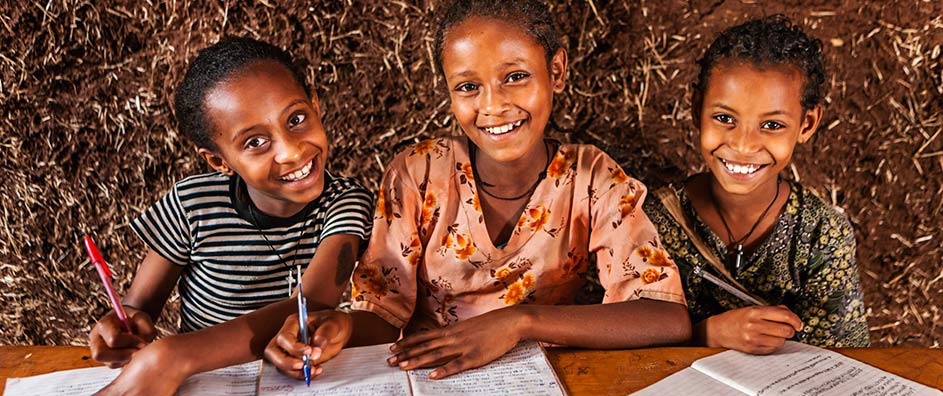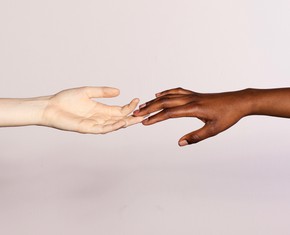The views expressed in our content reflect individual perspectives and do not represent the authoritative views of the Baha'i Faith.
The primary concept of justice has profound connections to other principles of the Baha’i Faith. Baha’u’llah tells us that we should have one language for the whole world, so that we may understand each other. Abdu’l- Baha says:
The heart is like a box, and language is the key. Only by using the key can we open the box and observe the gems it contains. – The Promulgation of Universal Peace, p. 40.
After all, if we cannot understand each other, we cannot possibly do each other justice.
Circling round the core concept of justice, any seeker investigating the Baha’i teachings will find many more connections to familiar principles and teachings. Universal education, for example, arises out of a consideration of justice.
If we understand that a lack of education maims the human spirit, Baha’u’llah asks us to further realize that depriving any child of education constitutes a cruel injustice—not just to the individual, but to society itself. With this understanding we will never be tempted back into thinking, as one early nineteenth century British Member of Parliament did, that education was actually harmful to the working class:
…it would, in effect, be found to be prejudicial to their morals and happiness; it would teach them to despise their lot in life, instead of making them good servants in agriculture, and other laborious employments to which their rank in society had destined them… – Geoff Fox, Writers, Critics and Children, pp. 229-230.
The self-interest inherent in that politician’s view of education is obvious now, looking back as we do from the heights attained after the passage of two more centuries. Yet we often hear similar assumptions about the poor of the developing world. The economic advice given to debt-ridden countries in the poverty belt is to “reduce spending on things like health, education and development, while debt repayment and other economic policies have been made the priority.” This situation in fact benefits the wealthy countries, who sell “products to be consumed, not tools to produce. This maintains the monopolization of the tools of production, and assures a continued market for the product.” (http://www.globalissues.org/article/3/structural-adjustment-a-major-cause-of-poverty )
This hidden attitude toward education, buried out of our sight beneath core economic assumptions, will seem as ugly and self-evident to our descendants as the faults of our ancestors to us. If they understand justice, they must do something about the failure to provide education to any of their brothers and sisters, wherever they live in the world.
The Foundation of the Law
The connection between justice and education creates a circular stream, where justice for the individual flows around to become justice for the society. For if we truly educate all our children, and teach the principles of a just society to them from their earliest moments, we will have created the only foundation capable of supporting the new law of God, which will then offer justice to all humankind.
Abdu’l-Baha issues us a challenge when he says:
The individual must be educated to such a high degree that he would rather have his throat cut than tell a lie, and would think it easier to be slashed with a sword or pierced with a spear than to utter calumny or be carried away by wrath. – Selections from the Writings of Abdu’l-Baha, p. 136.
This may seem unobtainable in the context of our own permissive society, but in less permissive ages children learned that if they were found to be liars or cheats, this would result in a complete loss of personal honor, an experience so shaming that mere physical punishment could not begin to rival it. We need to revive that sense of personal honor, the Baha’i teachings say.
The capacity to feel such shame creates individuals who take part in an essentially self-policing society, holding themselves to account and taking responsibility for their own actions. We can create societies in which people think naturally in these terms—human beings have done it in the past. Alasdair Macintyre speaks of the creation of Benedictine monasteries in the period following the fall of the Western Roman Empire, when “men and women of good will” set about the “construction of new forms of community within which the moral life could be sustained so that both morality and civility might survive the coming ages of barbarism and darkness.” – After Virtue, p. 244.
Monasteries and convents were, however, privileged, walled, protected communities, islands moated off from the decaying society surrounding them. In that collapsing society standards of education and behavior continued to deteriorate until the reviving flow of ideas from the Islamic world rescued them, spurring the Age of Reason and the Renaissance. The Baha’i community, far from trying to build an island fortress, works toward creating a social structure where the highest standards become a shared possession, belonging equally to all.
Societies do not remain static. A living culture moves, in one direction or another. At the moment, the direction of movement in the teaching of values seems haphazard, lacking a clear moral compass. Humanity can move strongly upwards, extending itself toward the highest standards. Occasionally reached in the past, they could become universal in this new age. Such an elevated vision requires that we provide a level of education which produces adults who possess a deep caring for others, and serve radiantly in creating a loving and unified community. If we succeed, the children of those adults would follow suit, launching a cycle of constructive human development and assuring the future of real peace.
















Comments
Sign in or create an account
Continue with Googleor